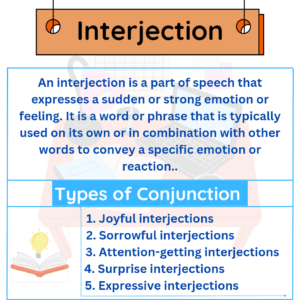An interjection is a word or phrase that expresses a sudden or strong feeling or emotion. It is often used to convey an emotional response to a situation and is usually placed at the beginning of a sentence.
Interjection Meaning and Definition
Interjection Meaning
An interjection is a part of speech that expresses a sudden or strong emotion or feeling. It is a word or phrase that is typically used on its own or in combination with other words to convey a specific emotion or reaction.
Interjections can be used to express a wide range of emotions, including surprise, joy, frustration, anger, pain, excitement, and many others.
Examples of interjections include “wow,” “ouch,” “oops,” “ah,” “hey,” “oh,” and “alas.” Interjections can be used in various forms of communication, including speech, writing, and online messaging, to convey the speaker’s emotions or reactions in a concise and powerful way
Interjection Definition
An interjection is a word or phrase used to express sudden emotion or strong feeling in a sentence. It is a part of speech that is used to convey a speaker’s attitude, emotion, or reaction to something.
Interjections can be used to show surprise, joy, excitement, disgust, anger, or any other strong feeling, and they are usually punctuated with an exclamation mark.
Examples of interjections include “wow!”, “ouch!”, “oh no!”, “bravo!”, “yikes!”, and “phew!”.
Types of Interjection
There are several kinds of interjections, including:
- Joyful interjections
- Sorrowful interjections
- Attention-getting interjections
- Surprise interjections
- Expressive interjections
Joyful interjections –
These express happiness or excitement, such as “Yay!” or “Hooray!”
Sorrowful interjections –
These express sadness or disappointment, such as “Alas!” or “Oh no!”
Attention-getting interjections –
These are used to get someone’s attention, such as “Hey!” or “Psst!”
Surprise interjections –
These express shock or surprise, such as “Wow!” or “Gosh!”
Expressive interjections –
These are used to convey a range of emotions, such as “Oh!”, “Ah!”, or “Eww!”.
Interjections are usually set off from the rest of the sentence by an exclamation point or a comma. They can be used to add emphasis to a statement, to show a character’s personality in literature or dialogue, or to express a sudden reaction in everyday conversation.
Rules for Interjection
There are no strict rules for using interjections, but they should be used sparingly to avoid sounding overly dramatic or distracting. In formal writing, they should be used only in certain situations, such as dialogue or to add emphasis.
Examples of Interjection
- Wow! That’s amazing!
- Ouch! That hurt!
- Oops! I dropped my phone.
- Yikes! That spider is huge!
- Hey! Come back here!
- Ahh! That sunset is beautiful!
- Hurray! We won the game!
- Oh no! I forgot my keys.
- Phew! That was close.
- Eww! This food is gross.
- Ugh! I can’t believe I have to do this.
- Aha! I finally understand.
- Hmm. I’m not sure what to do.
- Boo! You scared me.
- Shh! Be quiet, someone’s sleeping.
- Hmph! I don’t agree with you.
- Alas! I have lost my wallet.
- Yay! It’s my birthday!
- Hola! ¿Cómo estás? (Hello! How are you?)
- Good grief! I can’t believe this is happening.
- Bless you! You just sneezed.
- Gadzooks! What a mess!
- Gosh! I can’t remember where I parked.
- Oh dear! That’s not good.
- Darn! I missed my train.
- Ach! I stubbed my toe.
- Tsk tsk! That’s not very nice.
- Golly! That’s impressive.
- Crikey! That’s a big crocodile!
- Yoohoo! Is anyone home?
Conclusion
In conclusion, interjections are a type of word or phrase used to convey sudden or strong emotions. They come in different forms and are used in various contexts. While there are no strict rules for their use, they should be used carefully to avoid overuse or sounding unprofessional in formal writing.

